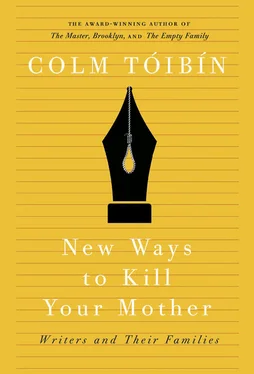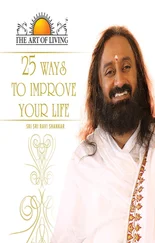Colm Tóibín
NEW WAYS TO KILL YOUR MOTHER
Writers and Their Families

Jane Austen, Henry James and the Death of the Mother
In November 1894 Henry James set down in his notebooks a sketch for the novel that became The Wings of the Dove , which was published eight years later. He wrote about a possible heroine who was dying but in love with life. ‘She is equally pathetic in her doom and in her horror of it. If she only could live just a little; just a little more — just a little longer.’ In his outline James also had in his mind a young man who ‘wishes he could make her taste of happiness, give her something that it breaks her heart to go without having known. That “something” can only be — of course — the chance to love and be loved.’ James also noted as a possibility the position of another woman to whom the man was ‘otherwise attached and committed… It appears inevitably, or necessarily, preliminary that his encounter with the tragic girl shall be through the other woman.’ He also saw the reason why the young man and the woman to whom he was committed could not marry. ‘They are obliged to wait… He has no income and she no fortune, or there is some insurmountable opposition on the part of her father. Her father, her family, have reasons for disliking the young man.’
This idea, then, of the dying young woman and the penniless young man on one side and, on the other, of father, family and young woman with no fortune circled in James’s fertile mind. There was no moment, it seemed, in which the second young woman would have a mother; it was ‘her father, her family’ that would oppose the marriage; over the next five or six years James would work out the form this opposition would take, and who exactly ‘her family’ would be.
In her book Novel Relations , Ruth Perry looked at the makeup of the family in the early years of the novel. ‘Despite the emphasis,’ she wrote, ‘on marriage and motherhood in late eighteenth-century society, mothers in novels of the period are notoriously absent — dead or otherwise missing. Just when motherhood was becoming central to the definition of femininity, when the modern conception of the all-nurturing, tender, soothing, ministering mother was being consolidated in English culture, she was being represented in fiction as a memory rather than as an active present reality.’
In nineteenth and early twentieth-century fiction, the family is often broken or disturbed or exposed, and the heroine is often alone, or strangely controlled and managed. If the heroine and the narrative itself are seeking completion in her marriage, then the journey there involves either the searching for figures outside the immediate family for support, or the breaking free from members of the family who seek to confine or dictate. In creating the new family upon marriage, the heroine needs to redefine her own family or usurp its power. In attempting to dramatize this, the novelist will use a series of tricks or systems almost naturally available to Jane Austen and the novelists who came after her; they could use shadowy or absent mothers and shining or manipulative aunts. The novel in English over the nineteenth century is filled with parents whose influence must be evaded or erased to be replaced by figures who operate either literally or figuratively as aunts, both kind and mean, both well-intentioned and duplicitous, both rescuing and destroying. The novel is a form ripe for orphans, or for those whose orphanhood will be all the more powerful for being figurative, or open to the suggestion, both sweet and sour, of surrogate parents.
It is easy to attribute the absence of mothers in novels of the eighteenth and nineteenth centuries to the large numbers of women who died in childbirth, as high as 10 per cent in the eighteenth century. The first wives of three of Jane Austen’s brothers died in childbirth, for example, leaving motherless children. But this explanation is too easy. If it had suited novelists to fill their books with living mothers — Jane Austen’s mother outlived her, for example — then they would have done so. In Novel Relations Ruth Perry takes the view that all the motherless heroines in the eighteenth-century novel — and all the play with substitutions — ‘may derive from a new necessity in an age of intensifying individualism’. This necessity involved separating from the mother, or destroying her, and replacing her with a mother-figure of choice. ‘This mother,’ Perry writes, ‘who is also a stranger may thus enable the heroine’s independent moral existence.’
Thus mothers get in the way in fiction; they take up the space that is better filled by indecision, by hope, by the slow growth of a personality, and by something more interesting and important as the novel itself developed. This was the idea of solitude, the idea that a key scene in a novel occurs when the heroine is alone, with no one to protect her, no one to confide in, no one to advise her, and no possibility of this. Thus her thoughts move inward, offering a drama not between generations, or between opinions, but within a wounded, deceived or conflicted self. The novel traces the mind at work, the mind in silence. The presence of a mother would be a breach of the essential privacy of the emerging self, of the sense of singleness and integrity, of an uncertain moral consciousness, of a pure and floating individuality on which the novel comes to depend. The conspiracy in the novel is thus not between a mother and her daughter, but rather between the protagonist and the reader.
Jane Austen’s last three novels have motherless heroines. Austen, however, does not allow this to appear as loss, or does not let this expose the heroine, or take up much of her time. Rather it increases her sense of self, it allows her personality to appear more intensely in the narrative as though slowly filling space that had been quietly and slyly left for that purpose.
In Pride and Prejudice there is a mother, but there are also two aunts, Elizabeth Bennet’s Aunt Gardiner and Mr Darcy’s aunt Lady Catherine de Bourgh. It is an aspect of Austen’s genius that, while the novel dissolves the power and influence of the mother, neutralizes her in ways both comic and blunt, the two aunts are painted in considerably different shades, one allowed a calm, civilizing subtlety, the other given a histrionic sense of entitlement. But none of the three older women in the book has any actual power, although two of them seek power and influence; power instead is handed directly to the heroine and this power arises from the quality of her own intelligence. It is her own ability to be alone, to move alone, to be seen alone, to come to conclusions alone, that sets her apart.
When Jane Austen’s niece herself became an aunt she wrote to her: ‘Now that you have become an Aunt, you are a person of some consequence & must excite great Interest whatever you do. I have always maintained the importance of aunts as much as possible, & I am sure of your doing the same now.’ Austen was close to her own nieces and nephews, looked after some of them after their mothers died, and seemed to have been remembered fondly by all of them. She also lived in the hope of an inheritance from her mother’s brother Mr Leigh-Perrot, who was married and lived in Bath. The Leigh-Perrots were childless and not amusing, but they had to be kept sweet. Her uncle’s will, which in 1817 left Austen and her siblings a thousand pounds only after their aunt’s death, did not help Austen as she herself was ill and died soon afterwards.
Читать дальше













